- Moment musical
- Adolphe Adam
- Bucharest
- Bosnia
- Caporale
- Masterworks Chorus of the Palm Beaches
- Andrew Ford
- Sophie Gent
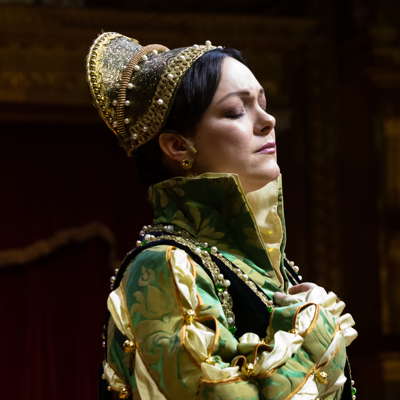 FROM ROME: From December 2009 until March 2023, the late Giuseppe Pennisi sent us regular reports from the Italian opera and classical music scene.
FROM ROME: From December 2009 until March 2023, the late Giuseppe Pennisi sent us regular reports from the Italian opera and classical music scene.
 UPDATES: There's a new feature every day at Classical Music Daily. Read about the various ways we can keep in touch with you about what's happening here.
UPDATES: There's a new feature every day at Classical Music Daily. Read about the various ways we can keep in touch with you about what's happening here.
Creativity, Imagination and Curiosity

RON BIERMAN talks to American mezzo Stephanie Blythe
Stephanie Blythe is probably the only opera singer who represents a ukulele company. That she embodies the unexpected is further confirmed by her upcoming roles in the San Diego Opera's next production, two one-act operas by Puccini. The mezzo soprano will first sing a deeper contralto as the Principessa in Suor Angelica. Then, in the title role of Gianni Schicchi, she'll be in the baritone range traditionally assigned to a male singer.
A headline once nailed it: 'Stephanie Blythe can do anything, and apparently will.' The 'can do' is appropriate for a singer who, in 1995, just eighteen months out of school, landed at the Metropolitan Opera and has performed there in a wide variety of roles ever since. We spoke via Zoom about her career and the roles she will be singing in four performances, the first on 11 February 2023.
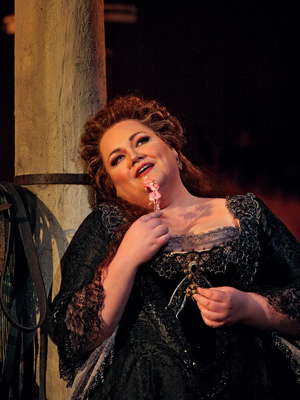
Stephanie Blythe as Eduige in Handel's Rodelinda at New York Metropolitan Opera. Photo © 2014 Ken Howard
San Diego audiences have seen her in grand opera, Verdi's Requiem, a recital of songs associated with Kate Smith, and last year, a recital of the pop songs of Johnny Mercer. She's had the lead in Carmen, but recently starred in Chicago as Don José, Carmen's bewitched lover. 'And I had the most marvelous time. This is not a lark for me. I take it very seriously. And I'm not trying to thumb my nose at anybody. I'm just trying to make the art that I can, that I dreamed of doing.' (In case you wondered, the reviews were favorable.)
You might think all that covers apparently will do anything, but the headline I quoted was triggered by a Philadelphia drag show in which she donned a beard and mustache to become her twin, tenor Blithely Oratonio. They've begun to sing video duets on Twitter. Can a recording of Carmen with her in every role be far behind? (Though the bass-baritone of the Toreador may be a challenge.)
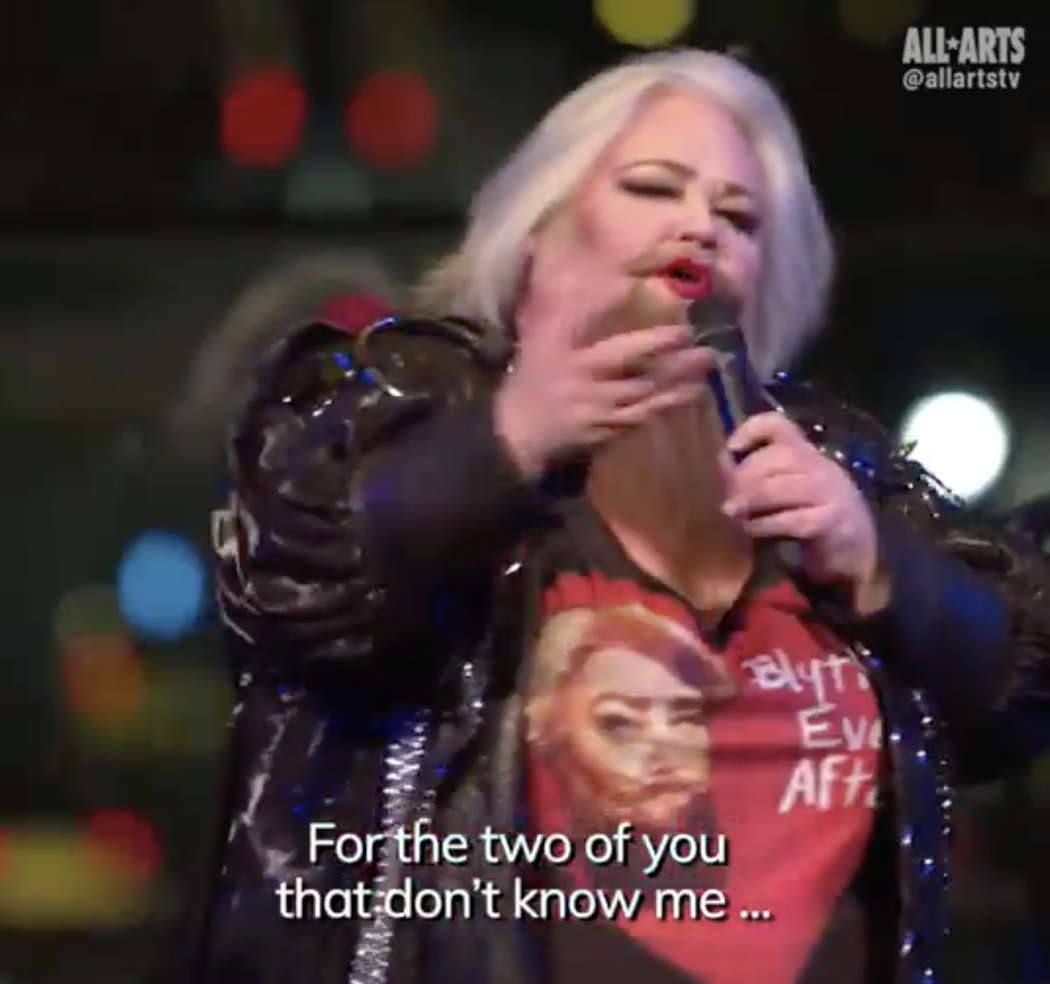
Stephanie Blythe as Blithely Oratonio
The two one-act operas in her upcoming performance are taken from a set of three Puccini works titled Il trittico. I wondered if singing two characters in different voice ranges required more rehearsal time.
'This isn't the first time I've done multiple roles in a show. I've often sung in (Handel's) Julius Caesar, first as Tolomeo, then Cornelia, then Caesar, and back to Cornelia. I've been doing Il trittico for a very long time and often had a different role in each one. Rehearsal for multiple roles depends on the piece and the company, but I'm used to it, and we have enough.'
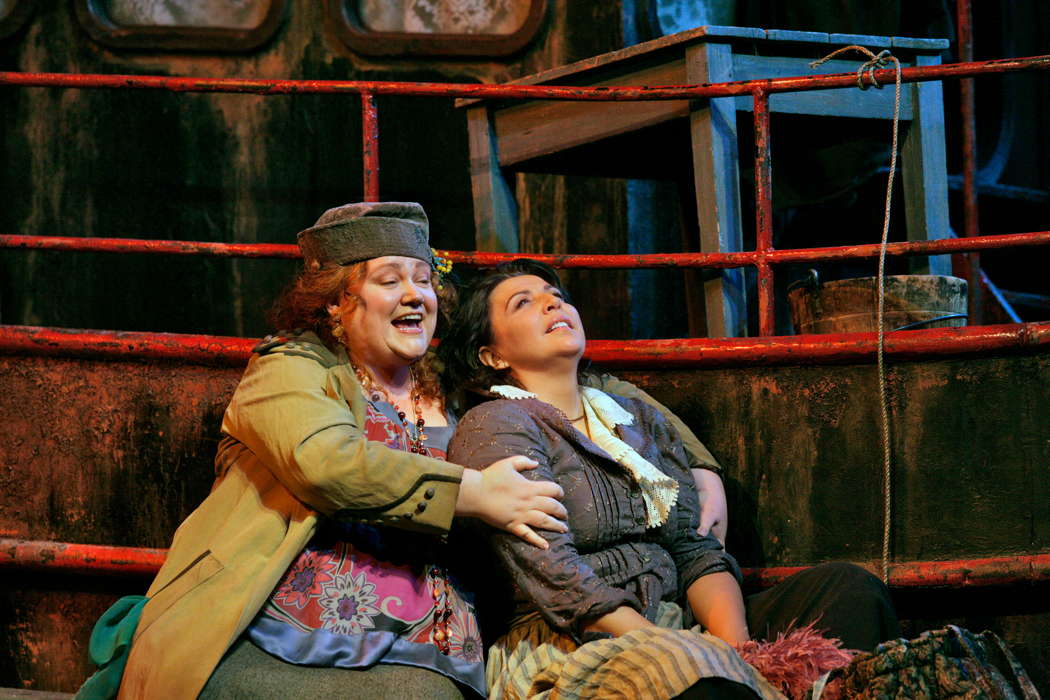
Stephanie Blythe (left) and Maria Guleghina in Puccini's 'Il Tabarro', the first part of 'Il trittico', at New York Metropolitan Opera. Photo © 2007 Ken Howard
Having performed multiple roles in the same opera allows a deeper understanding of what the composer had in mind and how characters interact. Costumes are another priority in her chameleon-like approach to new roles.
'Absolutely! There's a lot of wonderful work that you can do in staging, too. But once the costume comes on, that really is the thing. It changes the way you move, the way you feel about yourself, because it's a part of how you signal to the world who you are.'
Why does Blythe take on so many roles? 'I'm attracted to projects that allow me to explore different passions and transitions in my life. I think 'transition' is one of the most important words for any artist. Voices change from the moment you start singing. It's never the same - from one day, one year, one decade to the next. It's part of the body, and so affected by intellectual, physical and spiritual change. And that has to be accepted.'
A recent change for her is an appointment to Bard College. 'I accepted the position of Artistic Director of Bard's graduate Vocal Arts program one semester before the pandemic started. When my performances had to be canceled because of the pandemic, I had this teaching job, and I really enjoyed it. I adore working with the students. I love my colleagues. Many professional performers teach there, and I prefer that.
'From this point on it will be a major focal point. I want to teach young singers to build on technique, research, and study of course, but to really focus on what makes them unique.
'I feel like my soul is fed every day I work with students and young artists, and especially the singers and pianists. They are so enterprising and have so many interests.' They don't want to play concerts just to check academic boxes. There's a thought-out reason 'based on who they are and what they want to say, and I think that's marvelous.'
Stephanie Blythe's Dad had no use for singers. 'He liked my voice, but I wasn't allowed to sing in the chorus. So all through junior high I wanted to be part of a rock band with my three best friends. But since we played euphonium, trombone, saxophone and flute, I was like, well, that's not going to work. We formed a barbershop quartet instead. And that was the singing I did in junior high. When I got into high school, my choral conductor Martin Banner insisted that I join the chorus and called my father to change his mind about that. Thank God for Martin Banner. Joining the chorus has led to everything for me.
'I came to the actual idea of wanting to be an opera singer relatively late. I was about twenty-one. I'd waffled around in college for six years and gotten two bachelor's degrees, the first in English. Then I thought "what next?" Might as well finish my music degree. I was very fortunate in having a wonderful voice teacher, Patricia Misslin, who told me "I think you can have a career of singing".' Again, dad wasn't in favor. This time a voice teacher's phone call changed his mind.
Blythe's professional career began soon after with a minor offstage role in a Met production of Parsifal. A whirlwind of favorable reviews and success followed, but at times felt overwhelming. 'No wonder I started having anxiety attacks. They started my second year in the young artists program at the Met.' She managed it on her own for about a year. The intensity of the attacks and a few trips to an emergency room convinced her she needed help. It took seven years of therapy and self-examination before the attacks were under control.
Fortunately, her level of stage fright during that time and since has never been greater than most artists feel before a performance. 'You'll find a handful that are just total animals, and don't experience it. I do, but I enjoy being on the stage. I'm usually sitting offstage waiting to go twenty-to-thirty minutes before anyone else. First, because I can't wait to go, and second, it's a way I psych myself up. It takes a lot to get up in front of a load of people and tell a story. But I've never wanted to do anything else even if it is terrifying.'
Terrifying, but sometimes immensely satisfying. A peak moment came almost a decade after her debut. 'I realized I was really an opera singer while I was in Covent Garden sitting in front of the fire curtain having a promo rehearsal with the orchestra. I was singing as a trainer in this incredible theater and I thought, holy crap, you're actually doing it. I had been for quite a while, but it wasn't until that moment that it just kind of washed over me like a huge wave. I'll never forget that feeling, never.'
Are there moments she would rather forget? 'Nope. Because I'm grateful for every single thing I've ever done, even the things that weren't as successful. Every moment I've ever had on the stage has informed the next moment. Blythely Oratonio is all about transitions, about turning fifty and how life is going now. It's autobiographical, and how fortunate I feel to have been able to take that journey with an incredible group of artists who held up a mirror to me that brought new and interesting ideas.'
Though Blythe has won several prestigious awards as an opera singer and her operatic repertoire is huge, she grew up with a jazz-musician father and also loves pop music.
Sammy Davis, Jr is a favorite. 'I listen to his Love Me or Leave Me almost every day. So much energy and rhythm. He was a total entertainer, and that's all I've ever wanted to be. I'd love to do more Broadway if I could dance.'
Kate Smith is another favorite. 'I started getting into the Great American Songbook when I wrote the show about Kate Smith. As I was working on it and learning about that music, I became interested in the lyricists and composers of the period.' She learned that many popular songs had been written on the ukulele. It's easy to play and portable. On opening night her accompanist Craig Terry gave her a soprano uke. 'I didn't know what to do with it. I thought, these fingers can't play a soprano ukulele. It sat for about four years. Then I decided I'd get the larger tenor, which is much easier to play. After I learned three or four songs, I was hooked and have thirteen or fourteen ukuleles today.'
A number of those are made by Lanikai. The company noticed she was using one in her shows, and asked if she would represent them. And she now does.
Stephanie Blythe looks for 'creativity, imagination and curiosity' in her students. The first two are required of any good artist. Curiosity is a little less obvious, but she credits it for her ever expanding interests. Kate Smith led to reading about songwriters, which in turn led to playing ukulele, then writing her own songs and designing new concerts and cabaret shows.
So far none of her many other interests have prevented her from taking on new operatic roles, the most recent is the lead in Puccini's Gianni Schicchi, yet another example of an opera she's done before in a different role. She sang Aunt Zita, a comedic troublemaker, as a mezzo soprano, first as a seventeen-year-old college freshman and later with the Met. This time the vocal leap is even greater than her switch between mezzo and tenor in Carmen. Zita is a contralto, Schicchi a baritone. Can she sink any lower? (Vocally that is.) Well, one of the roles she's best-known for is Mistress Quickly in Verdi's Falstaff, also contralto. She'd love to take on the tragicomedic lead (bass-baritone.) Stay tuned.
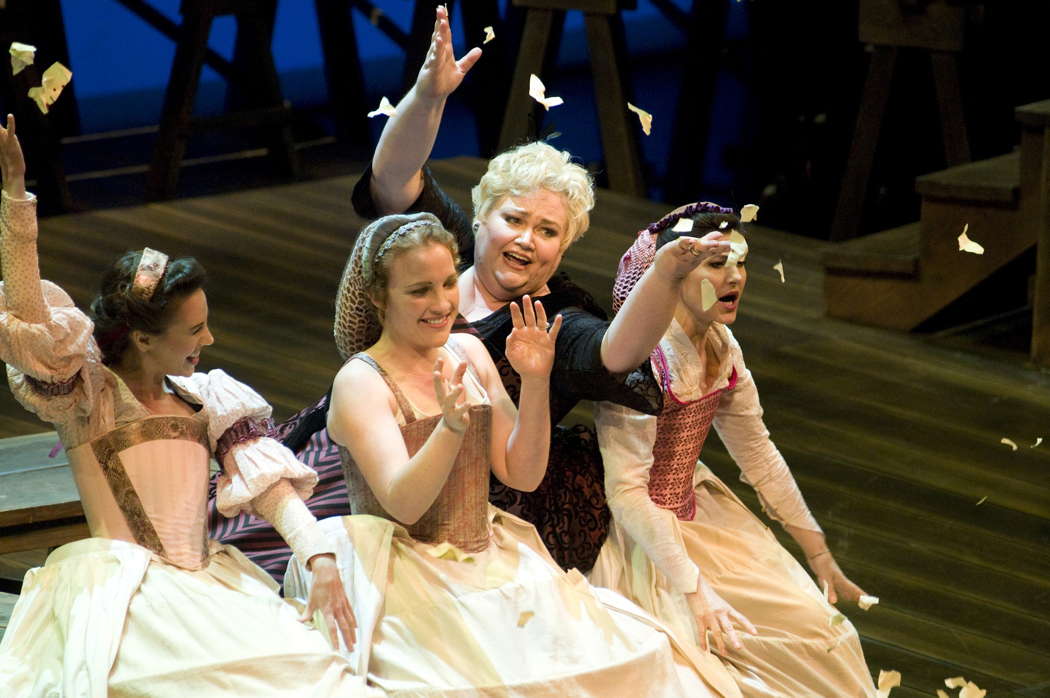
From left to right: Anya Matanovic as Nannetta, Sasha Cooke as Meg Page, Stephanie Blythe as Dame Quickly and Svetla Vassileva as Alice Ford in Verdi's 'Falstaff'. Photo © 2010 Rozarii Lynch
When we switched to a discussion of opera's popularity, or lack thereof, I suggested that many thought of the genre as elitist.
'I've almost never come across a performer who thinks about opera as elitist. But I've come across plenty of people who present it that do. Opera wasn't written in the beginning for a specific demographic, it was written for people as an entertainment.'
New York Times critic Bernard Holland agrees. He once wrote that, in addition to royalty and the rich, 'Mozart spoke ... to the people in the streets, who wanted their opera in German, preferably in Viennese dialect ... The Magic Flute was the eighteenth century's Sound of Music and The Producers in one.'
Blythe said, 'Opera is big and broad and friggin' expensive, right? I think that we are coming to a place now, where everyone who presents opera realizes that people want an event, to be touched, and to feel like they're a part of it. When my dad went to see the Met's HD broadcasts, he didn't talk about the singing, he talked about the stage, intermission and seeing everything that happened backstage.
'Opera is only thought of as elitist because the industry decided that's what we wanted to appeal to.' We didn't have time to discuss that further, but I believe the industry has driven itself to 'friggin' expensive', and that's a subject that would have made this a six-part article. Instead, we ended with Blythe's impression of the San Diego Opera, the upcoming production, and a final very personal thank you.
'I love the fact that this company has shown very clearly that the audience wants them. (Public support prevented bankruptcy.) And it went to great lengths to support its audience and its artists during the pandemic. I think they were really in the top echelon of American companies who were dealing with the pandemic in a smart way, a way that supported artists and led to interesting performances in new venues.
'The generosity the company has shown me over these years has really been lovely, and it just makes you want to keep coming back and inspires you to do better. Both of these casts are wonderful, and I'm very much looking forward to the performances.
'I also have to give a big shout out to my husband. We've just celebrated our twenty-first anniversary. And I don't know how I would have done any of this without him.'
Copyright © 16 February 2023
Ron Bierman,
San Diego, USA



